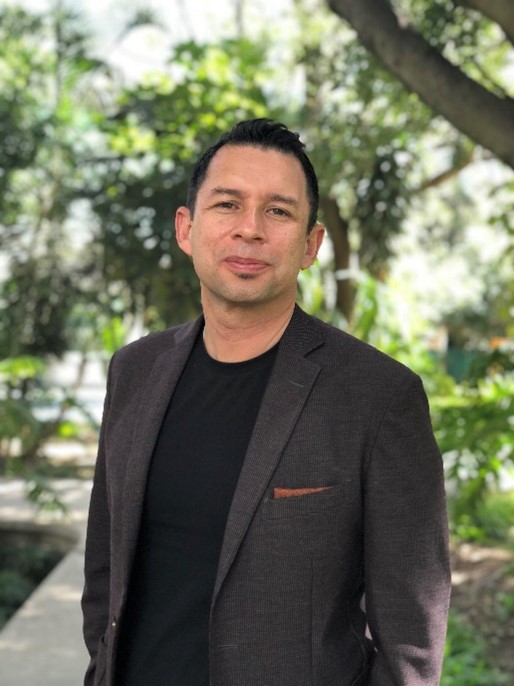BIOGRAPHY:  Victor M. LARIOS pursued his higher education degree programs
at the ITESO University in Mexico (BSc in Electronics Engineering) and
graduated in 1996. In 1997 he received his M.Sc. at the Université de
Technologie de Compiègne in France and his Ph.D. in Informatics Engineering in
2001. In 2004 he was appointed as a Full
Professor in the Information Systems Department at the University of
Guadalajara (UDG).
Victor M. LARIOS pursued his higher education degree programs
at the ITESO University in Mexico (BSc in Electronics Engineering) and
graduated in 1996. In 1997 he received his M.Sc. at the Université de
Technologie de Compiègne in France and his Ph.D. in Informatics Engineering in
2001. In 2004 he was appointed as a Full
Professor in the Information Systems Department at the University of
Guadalajara (UDG).
Since April 2014, Dr. Victor M. Larios has been the funder
and director of the Smart Cities Innovation Center (SCIC) at UDG. He led
a group of researchers in Smart Cities and Information Technologies. The SCIC
is a think-thank to help the government, industry, and other academic partners
join efforts to improve life quality by using IT as the main transformation
vehicle. His primary research interests are Smart Cities, IoT Distributed
Systems, Networking, Multiagent Systems, and Data Visualization using Virtual
Reality.
Dr. Larios published more than 70 papers in international refereed
journals and conferences and published a Serious Games book. As a continuous
activity, Dr. Larios collaborates in projects with the High Technology industry
and government using design thinking and agile methodologies to accelerate
technology transfer in living labs. As an entrepreneur, he is the founder and
CIO of IDI Smart Cities, collaborating with Advion Solutions LTD from Finland.
The main activities are market research and international projects supporting
Latin American Countries and the European Union. More specifically,
efforts are to introduce the Circular Economic Model as a sustainability component
for the Mega-Cities and support scholarships to develop local talent.
As a
volunteer, Dr. Larios is also a technical advisor for the Guadalajara Smart
City project for the government and international NGOs such as IEEE. Victor M. Larios
is a Senior Member at IEEE with 29 years of membership and the local leader of
Guadalajara Core City at the IEEE Smart Cities Initiative since 2013. In 2019
he started to support the Internet of People (IoP) projects with Joel Myers,
director of the IEEE IoT Smart Cities Vertical.
ABSTRACT: Enabling the metaverse in the smart cities as a potential tool for cultural heritage applications
By the end of the 1990s, a big bet for the internet was to offer a virtual reality experience in hyperspace navigation as the next step from what we knew as the standard 2D Web navigators. An international group on the Web worked in the Virtual Reality Modelling Language to replace the HTML language. There were expectations in how this environment with multiuser shared experiences could help in education, cultural heritage, remote teams work, and more could evolve the use of the internet. However, at that time, technology was not ready to create a metaverse on the internet. Hardware was limited for processing, storing data, high-speed connectivity, and screen resolution.
Two decades later, the Metaverse results from high-speed connectivity to virtual reality immersive environments over the internet. Video games evolved their metaverses with consistent information and realistic interactive multiuser virtual environments. At the same time, we face a digital transformation where IoT devices capture data about how we behave in cities. We have flows of data from many sources in historical data repositories. This data is curated, analysed, and helps city authorities make data-driven decisions for better city management.
From a philosophical point of view, any society needs to understand their past to be better in the present and choose which future they want to build. The Metaverse offers a unique possibility for a society in a city to recreate a version of the past to understand their cultural heritage in a shared and fully immersive experience and then understand the present and propose different versions of how the future could be. That should lead to better places to live and have better education for the people in all senses.
However, to achieve the next evolution of the internet, we need leading initiatives and standards. For example, current virtual reality interfaces from different vendors need to connect to the same Metaverse. In addition, developers need to build VR interoperable objects, behaviours, and environments. But in this decade, most of the technology is ready for the Metaverse, and cultural heritage can have a meaningful impact on applications in this new environment.
|